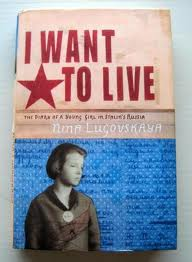I WANT TO LIVE/ Я хочу жить by Nina Lugovskaya

The culture that emerged out of the Russian revolution now seems as distant as that of the ancient pharaohs. It is easy to forget that what was attempted was the creation of a whole new civilisation and a whole new mindset about the human condition. That this experiment ended in the grotesque phenomenon of Stalinism may or may not have been inevitable, as Victor Serge observed the revolution did carry the seeds of Stalinism, but there were other seeds as well and the strangulation of the hopes and aspirations of the revolutionary generation of the 1890’s is one of the great tragedies of the age.
Given that this period in history now seems so distant it astonishes me to think that Nina’s diary was written merely twenty years before I was born. The world it describes is long gone the emotional struggles of adolescence that it describes are universal. The combination of intelligence and sensitivity represents a heady cocktail; cocktails are dangerous things at any time of life but in adolescence can be explosive. It nearly killed Nina who had a particularly morbid adolescent obsession with suicide.
The diary has been compared to that of Ann Frank, wholly erroneously in my opinion, Ann’s diary is concerned with a situation of absolute abnormality whilst nothing could be more normal than the adolescent experience described by Nina. True there is the situation with her father, a Socialist Revolutionary who constantly faces arrest and harassment and the background of an ascendant Stalinism, but this impinges little on her life at school and her endless teenage crushes. Whenever the historical setting does break in it can be startling and set the hair on end, as when she describes the news breaking of  Her response renders her clearly guilty by Soviet standards of jurisprudence, though innocence or guilt are meaningless terms when speaking of the Stalinist terror. Many of Stalin’s avowed allies perished declaring their support, indeed love for the great leader; whilst those ‘guilty’ of much, much milder observations than Nina were put up against the wall and shot. It is interesting to speculate that Nina survived just because she did represent the real McCoy; here was a live specimen to prove that the threat was real.
Her response renders her clearly guilty by Soviet standards of jurisprudence, though innocence or guilt are meaningless terms when speaking of the Stalinist terror. Many of Stalin’s avowed allies perished declaring their support, indeed love for the great leader; whilst those ‘guilty’ of much, much milder observations than Nina were put up against the wall and shot. It is interesting to speculate that Nina survived just because she did represent the real McCoy; here was a live specimen to prove that the threat was real.The passages in Nina’s diary that most attracted the attention of her NKVD interrogators they underlined and here are reproduced in bold type, therefore we are not alone in reading this diary, we share the experience with these anonymous NKVD goons. It raises all sorts of questions as to what possibly could be going through their minds. The thought of these men and possibly women, reading through the angst ridden diary of a troubled schoolgirl, with a view to incriminating her, truly turns the stomach. They seem to have been particularly concerned with Nina’s suicidal impulses, confirming something I have long thought, that is that suicide represents a real threat to all totalitarian, autocratic and theocratic regimes, affirming as it does that ones life belongs to you, not to the church or the state.
The opening of the archives in Russia Eastern Europe of the twentieth century. Nina is highly literate, passionate and has the ability to see things clearly and for what they are, thus in 1934 at a time when Western intellectuals like the Webb’s and Bernard Shaw were lauding Soviet Russia and fawning at Stalin’s feet she is able to write “…to proclaim outrageous laws so insolently in the name of the people, to lie as they do behind big words that no longer have any meaning like – ‘Socialism’ and ‘Communism.’ …..This is the rule of the inquisition, not Socialism.” Here is at least one person who already understands the communist abuse of language. It is tempting to write, so I write it, that it takes a young girl to see that the king is naked, but the comparison feels shallow.
Nina is obviously a bit of a snob, perhaps a little young for her age when she reaches 18 and is often given over to excessive self pity; though it seems likely that she was diagnosable as a depressive. But victims are not saints and we do them a disservice by expecting them to be somehow morally superior. Nina is simply a flawed human being, an awkward adolescent, this was her crime.
 After torture by the NKVD Nina was sent to the
After torture by the NKVD Nina was sent to the She, her mother and sisters all amazingly survived their incarceration, a great many did not. She then established life for herself as a painter, never writing again. She managed to survive the demise of the Soviet Union by just two years.
Having visited this page I would be grateful for your feedback, either tick one of the boxes below or make a comment via the comments button.
Побывав в этой страничке я был бы признателен за Ваш комментарий, или отметьте один из ящиков ниже или оставить комментарии с помощью кнопки комментариев.


